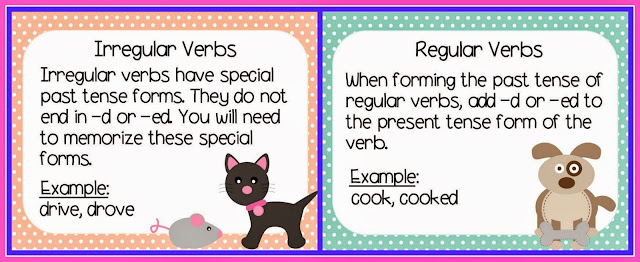Parts of speech
1.- Parts of speech.
Regular and Irregular verbs

1.- List of verbs

Differences between
AMERICA and BRITISH
1.- B*tch/ Beach.
2.- Island.
3.- Church.
4.- Salmon.
5.- Schedule.
6.- Soup.
7.- on purpose.
8.- T - X- CK
9.- TH sound
11.- Many others.
12.- Ain´t
13.- Wear & Use
How to use:
1.- AS and LIKE: 1 2 3
2.- SO and SUCH:
3.- FOR and TO:
4.- WILL/GOING TO:
5.- IN, ON, AT: 2
6.- EITHER and NEITHER:
9.- GET.
10.- TRIP, TRAVEL and JOURNEY:
11.- KNOW and MEET.
12.- SEE, LOOK and WATCH:
13.- LEND and BORROW:
14.- ME and I
Exercises: 1 2
16.- PARTICIPLE AS ADJECTIVES (-ED/-ING)
Exercises: 1 2 3 4 5
17.- EITHER, NEITHER and SO 2 3
Exercises: 1 2 3 4 5
18.- SAY and TELL 2 3

Exercises: 1 2 3 4
19.- 200 PHRASAL VERBS
20.- COLLOCATIONS (DO and MAKE) 2
Exercises: 1 2 3 4 5 6 7 8
21.- ESL JOKES
22.- USEFUL EXPRESSIONS
Exercises: 1 2 3 4 5 6 7
23.- Differences between WHILE /WHEN. 1
Exercises: 1 2 3 4
Articles.
1.- Grammar.
2.- Video a-an-the.
Pronouns and Adjectives.
1.-Subject and object pronouns. Ex. 1 2 3
2.-Possessive Adjectives. Ex. 1 2 3
3.-Possessive Pronouns. Ex. 1 2 3
4.- Reflexive Pronouns. Ex. 1 2 3
5.-Possessive Adjective vs Pronoun. Ex. 1 2 3
6.-More exercises 1
VERBAL TENSES:
Verb to-be in PRESENT
The verb to-be is used in a number of different ways in English. The main uses of the verb to-be are for reference, self-study and in-class use. The verb to-be is used as a main verb to indicate the role or position that one has at work, family or other organization. e.g.
Jennifer is my little daughter.
My bosses are good entrepreuners.
Luisa was a guest at our house last month.
5.- Exercises 2 3 4 5
Verb to-be in PAST.
Present continuous or progressive.
It expresses an activity which is in progress at the moment of speaking. Words like right now, at the moment, now etc are used in this tense.

Past progressive or continuous.
It refers to an activity taking place when another activity occured, or two simultaneous actions which were in progress "during that time" While is often used in this tense.
Countable and Uncountable nouns
Demonstrative Pronouns
There is and There are.
Rules for forming plural.


3.- Exercises 1 2 3
Simple present
This tense refers to general truths and repeated or customary acts; Adverbs of frequency such as always and usually often accompany this tense.
Simple past
Expresses a completed action, which occurred at a specified time in the past. Words such as yesterday, last week, the day before yesterday etc are used in this tense.
Comparatives and Superlatives

1.- What is comparative? 1 2 3 4
2.- What is the superlative? 1 2 3 4
3.- Comparative and superlative 2 3 4 5 6
4.- Exercises for kids.
Quantifiers

Time sequencers
and Connectors.

Adjectives and Adverbs

3.- Exercises 1 2 3 4
Present Perfect
It expresses an action or state, which began in the past and continuous in the present. The following words and expressions usually accompany this tense: SINCE + a starting point in time, FOR + a duration of time.
Yet, Already and Just.
Present Perfect Continuous.
It emphasizes the duration of an activity, which began in the past and continuous to the present. Words like: for, since, all week, all night etc are used in this tense.

Past Perfect Tense
It describes an activity which occured or was completed before another action or time in the past or which continued up to another time in the past.
Past Perfect Continuous.
Future Perfect Tense

Future Tense
It emphasizes the duration of an activity or state, which continued up to a time in the past.
Future Perfect Tense
It expresses an action which will occur or will be completed before another action or at a time in the future.

Future Tense
It expresses an intended expected action in the future.
Future Continuous
It describes an activity, which will be in progress at or up to a certain time in the future.

Modal verbs
Active and Passive Voice
Active Voice.
A feature of sentences in which the subject performs the action of the verb and the direct object is the goal or the recipient: The mechanic fixed the car.
Passive Voice.
A feature of sentences in which the object or goal of the action functions as the sentence subject and the main verb phrase includes the verb to be and the past participle: The car was fixed by the mechanic.
|

WH-Questions
Reported Speech
It is a description of what someone has said without using the exact words used.

Adverb Clause
Adjective Clause
Adjective-Adverb Collocations
Connectors
IF Conditionals
The conditional tense says that an action is reliant on something else. The conditionals are used to talk about real or unreal situations, they are sometimes called if-clauses. Real Conditional describes real-life situations. Unreal Conditional describes unreal, imaginary situations.
For example:
If a certain condition is true, then a particular result happens.
There are four basic conditionals that we use in English.
Zero Conditional
First Conditional
Second Conditional
Third Conditional
Zero Conditional
First Conditional
Second Conditional
Third Conditional
The Zero Conditional is used for actions that are always true when the conditions are satisfied. The structure of the conditionals is straightforward.
First Conditional sentence is for future actions dependent on the result of another future action or event, where there is a reasonable possibility of the conditions for the action being satisfied.
The Second Conditional can be used used to talk about imaginary present situations, where we are imagining something different from what is really the case. We can also use it to talk about things in the future that are unlikely to happen, as the condition is unlikely to be met. We use the past tense in the condition part and would for the result.
The Third Conditional is used when we are talking about the past and imagining something different from what actually happened, that means for imaginary past actions, where the conditions for the action WERE NOT satisfied.
Conditional grammar.
1.- Zero Conditional.
2.- First Conditional.
3.- Second Conditional.
4.- Third Conditional.
Exercises: 1 2 3 4
5.- Games: 1 2 3
PHRASAL VERBS
1.- Get.
2.- Phrasal verbs 1. (A.I.)
3.- Phrasal verbs 2. (AI)
4.- Phrasal verbs 3. (AI)
5.- Phrasal verbs 4 (AI)
6.- Phrasal verbs 5 (AI)
7.- Phrasal verbs 6 (AI)
8.- Phrasal verbs 7 (AI)
9.- Phrasal verbs 8 (AI)
10.- Phrasal verbs 9 (AI)
11.- Phrasal verbs 10 (AI)
12.- Phrasal verbs
2.- Phrasal verbs 1. (A.I.)
3.- Phrasal verbs 2. (AI)
4.- Phrasal verbs 3. (AI)
5.- Phrasal verbs 4 (AI)
6.- Phrasal verbs 5 (AI)
7.- Phrasal verbs 6 (AI)
8.- Phrasal verbs 7 (AI)
9.- Phrasal verbs 8 (AI)
10.- Phrasal verbs 9 (AI)
11.- Phrasal verbs 10 (AI)
12.- Phrasal verbs
ENGLISH IDIOMS

2.- When to Use "Like" vs. "As" .
3.- Like or as.
4.- Written exercises.
5.- Written exercises 2.
6.- Written exercises 3.
3.- Like or as.
4.- Written exercises.
5.- Written exercises 2.
6.- Written exercises 3.














































Great post.
ResponderBorrarhttps://pastebin.com/u/GregoryScott
Great post.
ResponderBorrarhttp://www.cplusplus.com/user/VanceWeinberger/
Great post.
ResponderBorrarhttps://confengine.com/user/brian-deshong